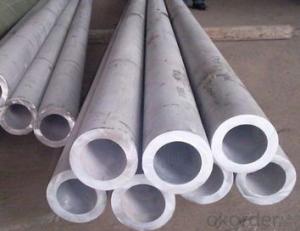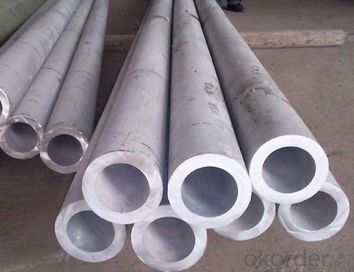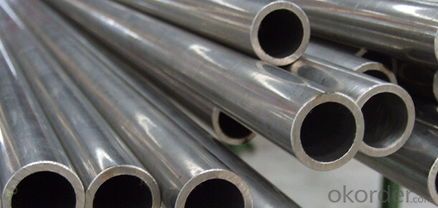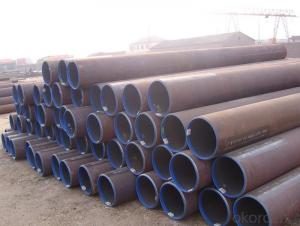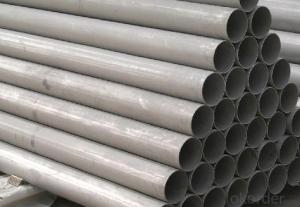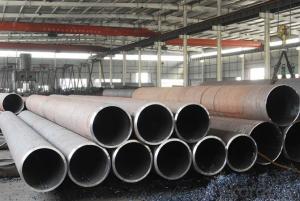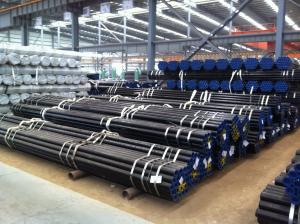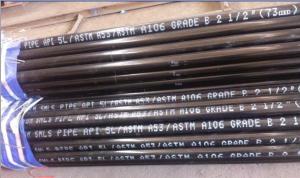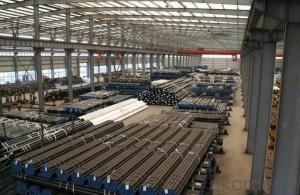Seamless Carbon Steel Pipe API 5L For Oil Application
- Loading Port:
- Tianjin
- Payment Terms:
- TT OR LC
- Min Order Qty:
- 25 m.t.
- Supply Capability:
- 10000 m.t./month
OKorder Service Pledge
OKorder Financial Service
You Might Also Like
Product Description:
1、Structure of Seamless Carbon Steel Pipe API 5L For Oil Application:
Seamless pipe is formed by drawing a solid billet over a piercing rod to create the hollow shell. As the manufacturing process does not include any welding, seamless pipes are perceived to be stronger and more reliable. Historically seamless pipe was regarded as withstanding pressure better than other types, and was often more easily available than welded pipe.
2、Main Features of Seamless Carbon Steel Pipe API 5L For Oil Application:
• High manufacturing accuracy
• High strength
• Small inertia resistance
• Strong heat dissipation ability
• Good visual effect
• Reasonable price
3、Seamless Carbon Steel Pipe API 5L For Oil Application Images:
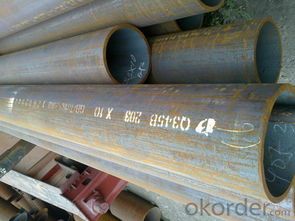
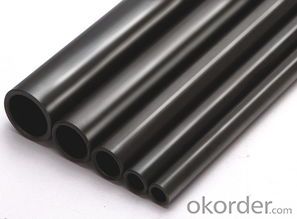
Packaging & Delivery
Packaging Details: | seaworthy package,bundles wrapped with strong steel strip |
Delivery Detail: | 15-30days after received 30%TT |
4、Seamless Carbon Steel Pipe API 5L For Oil Application Specification:
Standard | GB, DIN, ASTM |
Grade | 10#-45#, 16Mn |
Thickness | 8 - 33 mm |
Section Shape | Round |
Outer Diameter | 133 - 219 mm |
Place of Origin | Shandong, China (Mainland) |
Secondary Or Not | Non-secondary |
Application | Hydraulic Pipe |
Technique | Cold Drawn |
Certification | API |
Surface Treatment | factory state or painted black |
Special Pipe | API Pipe |
Alloy Or Not | Non-alloy |
Length | 5-12M |
Outer Diameter | 21.3-610mm |
Grade | 20#, 45#, Q345, API J55, API K55, API L80, API N80, API P110, A53B |
Standard | ASME, ASTM |
1.Material:20#(ASTM A 106/A53 GRB.API5LGRB,GB),45#,16Mn,10#.
2.Specification range:OD:21.3-610mm,WT:6-70mm,length:6-12m or according to the requirement of clients.
3.Excutive standards:GB,ASME API5L.ASTM A 106/A53,Despite of the above standards,we can also supply seamless steel pipe with standard of DIN,JIS,and so on,and also develop new products according to the requirements of our clients!
4.Surface:black lacquered,varnish coating or galvanized.
5.Ends:Beveled or square cut,plastic capped,painted.
6.Packing:bundles wrapped with strong steel strip,seaworthy packing.
5、FAQ of Seamless Carbon Steel Pipe API 5L For Oil Application:
①How is the quality of your products?
Our products are manufactured strictly according to national and internaional standard, and we take a test
on every pipe before delivered out. If you want see our quality certifications and all kinds of testing report, please just ask us for it.
Guaranteed: If products’ quality don’t accord to discription as we give or the promise before you place order, we promise 100% refund.
②How about price?
Yes, we are factory and be able to give you lowest price below market one, and we have a policy that “ for saving time and absolutely honest business attitude, we quote as lowest as possible for any customer, and discount can be given according to quantity”,if you like bargain and factory price is not low enough as you think, just don’t waste your time.Please trust the quotation we would give you, it is professional one.
③Why should you chose us?
Chose happens because of quality, then price, We can give you both.Additionally, we can also offer professional products inquiry, products knowledge train(for agents), smooth goods delivery, exellent customer solution proposals.Our service formula: good quality+good price+good service=customer’s trust
SGS test is available, customer inspection before shipping is welcome, third party inspection is no problem.
Any question, pls feel free to contact us !
- Q: Are steel pipes fire-resistant?
- Indeed, steel pipes possess fire-resistant qualities. Being a non-combustible substance, steel does not ignite or aid in the propagation of flames. Steel pipes exhibit elevated melting points and can endure extreme temperatures, rendering them exceptionally fire-resistant. Consequently, they find widespread utilization in critical areas necessitating fire safety measures, including fire sprinkler systems, fire hydrant systems, and fire-resistant architectural frameworks. Moreover, the fire resistance capabilities of steel pipes are reinforced by their renowned robustness and resilience.
- Q: What is the tensile strength of steel pipes?
- The grade and type of steel used can cause variation in the tensile strength of steel pipes. However, steel pipes generally possess a high tensile strength. Carbon steel pipes typically have a tensile strength range from 370 to 700 MPa, while alloy steel pipes can have a tensile strength range from 770 to 1200 MPa. These impressive tensile strengths enable steel pipes to withstand substantial pressure and stress, making them suitable for diverse applications in industries like construction, oil and gas, and automotive. It is important to recognize that factors like the manufacturing process, heat treatment, and the presence of defects or imperfections can also impact the tensile strength of steel pipes. Hence, it is recommended to consult the manufacturer's specifications or industry standards to determine the precise tensile strength of a specific steel pipe.
- Q: How do steel pipes compare to other materials like PVC or copper?
- Steel pipes have several advantages over other materials like PVC or copper. Firstly, steel pipes are incredibly strong and durable. They can withstand high pressure and extreme temperatures without cracking or bending. This makes them ideal for heavy-duty applications such as industrial piping systems or underground installations. Secondly, steel pipes have excellent corrosion resistance. Unlike copper pipes that can corrode over time, steel pipes are typically coated with anti-corrosive materials such as zinc or epoxy. This protective layer prevents rust and ensures a longer lifespan for the pipes. Furthermore, steel pipes offer superior fire resistance compared to PVC or copper. They are non-combustible and can withstand high temperatures for extended periods without deforming or releasing toxic gases. This makes steel pipes a safer option for applications where fire hazards are a concern. In terms of cost, steel pipes may be more expensive than PVC initially, but they offer better long-term value due to their durability and longevity. Copper pipes, on the other hand, can be quite expensive and are susceptible to theft due to their scrap value. Lastly, steel pipes are highly versatile and can be used in various applications, including water supply, sewage systems, gas pipelines, and oil refineries. They can handle high volumes of fluid with ease and are resistant to external factors like UV rays or physical impacts. Overall, steel pipes are a reliable and efficient choice for many industries and applications, offering strength, durability, corrosion resistance, fire resistance, and versatility that sets them apart from materials like PVC or copper.
- Q: What type of steel pipe for security windows?
- Stainless steel security window generally use 25 square tubes and 19 round tubes! 25/38 tubes and 22 round tubes are also available!
- Q: What are the different methods of measuring the thickness of steel pipes?
- There are several methods that can be used to measure the thickness of steel pipes, including ultrasonic testing, magnetic particle inspection, eddy current testing, and laser scanning.
- Q: How are steel pipes tested for leaks?
- Steel pipes can be tested for leaks using various methods, including hydrostatic testing, pneumatic testing, and using leak detection equipment such as ultrasonic testing or helium testing.
- Q: How are steel pipes used in the telecommunications sector?
- Steel pipes are commonly used in the telecommunications sector for underground cable management and protection. These pipes provide a durable and secure conduit for telecommunication cables, ensuring their safety from external factors such as weather, vandalism, and accidental damage. Steel pipes also offer excellent strength and resistance to corrosion, making them ideal for long-term use in telecommunications infrastructure.
- Q: What are the different types of joints used to connect steel pipes?
- Some of the different types of joints used to connect steel pipes include butt joints, socket weld joints, threaded joints, flanged joints, and grooved joints.
- Q: Can steel pipes be used for bridge construction?
- Yes, steel pipes can be used for bridge construction. Steel pipes are often used in the construction of bridges due to their high strength, durability, and ability to withstand heavy loads and harsh weather conditions. They can be used for various components of a bridge, including piers, supports, and even the bridge deck itself. Steel pipes are preferred in bridge construction as they provide excellent structural integrity and can be easily fabricated and installed.
- Q: How are steel pipes protected against ultraviolet radiation?
- Steel pipes are typically protected against ultraviolet radiation through the application of specialized coatings or paints that contain UV inhibitors. These coatings create a barrier between the steel surface and the harmful UV rays, preventing the degradation and discoloration of the pipes. Additionally, some steel pipes may be wrapped with UV-resistant tape or sleeves for added protection against prolonged exposure to sunlight.
Send your message to us
Seamless Carbon Steel Pipe API 5L For Oil Application
- Loading Port:
- Tianjin
- Payment Terms:
- TT OR LC
- Min Order Qty:
- 25 m.t.
- Supply Capability:
- 10000 m.t./month
OKorder Service Pledge
OKorder Financial Service
Similar products
Hot products
Hot Searches
Related keywords
